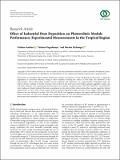| dc.description.abstract | Dust particle accumulation affects outdoor photovoltaic module transmittance of solar cell glazing and thus leads to significant degradation of conversion efficiency owing to lower irradiance reaching the surface. In this study, the sensitivity of the polycrystalline silicon photovoltaic module towards industrial dust deposition was experimentally investigated under the tropical climatic condition of Arusha, Tanzania. Dust involved in the study came from fertilizer, gypsum, aggregate crusher, and coal mine industries. The experimental measurements were outdoor conducted under 720 W/m2, 800 W/m2, and 900 W/m2 solar irradiances. Results indicated that dust accumulation on the polycrystalline silicon photovoltaic module negatively affected output power as well as short-circuit current, however having no significant impact on open-circuit voltage. Maximum module efficiency loss was observed to be 64%, 42%, 30%, and 29% for coal, aggregate, gypsum, and organic fertilizer dust, respectively; hence, coal dust was the most effecting dust among the four. It was also demonstrated that PV module performance deteriorated with temperature rise owing to heat dissipation caused by dust accumulation. | en_US |

